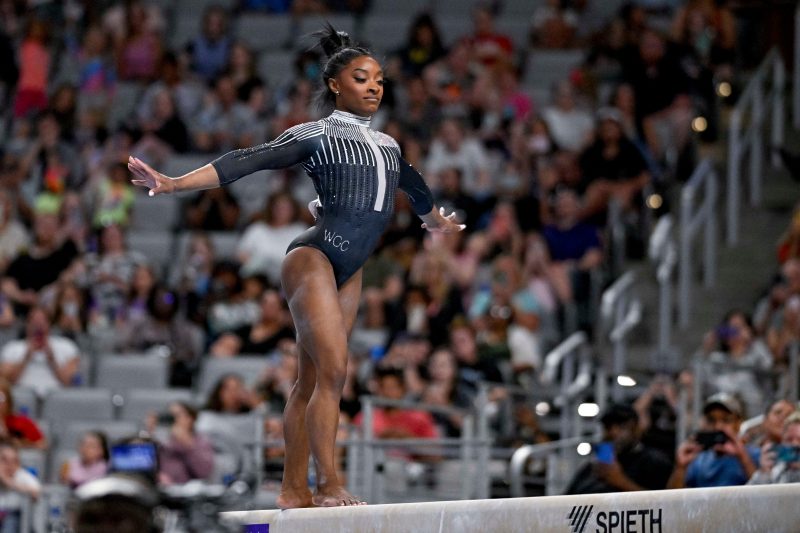It didn’t matter if she was missing the sleepovers or the parties or the vacations with friends or any of the other things people her age were doing. She could catch up when her gymnastics career was over.
Except one Olympic cycle became two and then three. As Biles watched her friends have weddings and babies, as she got married and her husband’s career took off, she realized there are no second chances on these rites of passage.
Gymnastics remains a priority, but she has found a way to make her life outside the gym a priority, too. Three years after the ‘twisties’ nightmare of the Tokyo Olympics that nearly ended her career, she’s a happier person − and a better athlete − because of it.
‘Life is not slowing down anymore. I could make sacrifices before, but now I’m at a point where some of these sacrifices, I can’t make anymore. Life is moving on, with or without me,’ Biles told USA TODAY Sports. ‘I’d rather ride that wave.’
Meet Team USA: See which athletes made the U.S. Olympic team and where they are from
Get Olympics updates in your texts! Join USA TODAY Sports’ WhatsApp Channel
Simone Biles’ pursuit of balance
That Biles is the greatest gymnast ever was settled long ago. She’s rewritten the record books with more medals at the world championships and Olympics than any other gymnast, male or female, and has pushed the boundaries of the sport by doing skills that once seemed unfathomable.
But Biles’ greatest legacy will be the way she has forced everyone to rethink their ideas about athletes and the demands put on them.
Gymnastics was once a sport that used to chew up young women and spit them out before their 20th birthdays. Athletes were supposed to be super-human, ignoring the stress and anxiety that are your insidious companions when your self-worth is determined by a clock or a judge. By pulling out of the Tokyo Olympics when her physical safety was at risk, and being unflinchingly honest about the mental health issues that brought on “the twisties,” Biles not only made it OK for athletes to ask for help, but she also forced sports leaders to recognize the need for a healthier, more supportive environment.
By carving out a life for herself outside gymnastics, Biles, who at 27 is better than she’s ever been, is showing every athlete they do not have to be one-dimensional. That there is more to them than their sport.
“Gymnastics was everything to me. And it still is, but I just have a different outlook on it,” she said. “Gymnastics is something that I do, but this is who I am outside of the sport. Rather than making it a whole blob.”
Biles didn’t wake up one morning and have an epiphany about this. It started after the Rio Olympics, when she took a year and a half off. She got to travel, and she bought a house.
Not being able to train for several months at the start of COVID played a role, too. When the world sees you as one thing, it can be hard to see yourself as anything else. But with the sports world shut down, Biles was forced to think about what she might want to do after gymnastics.
She had also just met Jonathan Owens, an NFL safety who is now her husband. The two hunkered down together during the initial shutdowns, and Biles saw there is more than one way to approach being an athlete.
‘(Elite athletes are) such creatures of routine and habit, it’s really easy to get stuck in that cycle of, ‘I’m comfortable or tired today, so I don’t want to do anything,” said Owens, now with the Chicago Bears. ‘But you have to put yourself first. Get a good refresher.
‘That’s why it’s always great to have a good balance,’ he added. ‘Work hard, but know that you do have to give yourself some time and grace.’
And then came Tokyo.
Most Olympic athletes will talk of feeling adrift when their competitive career ends, of not knowing what their purpose. But this was different. Biles was so devastated by her experience that she didn’t know if she would — or could — ever do gymnastics again.
So she focused on the rest of her life. She began going to therapy once a week, time that is now sacrosanct. She and Owens got engaged, and she planned every last detail of their destination wedding.
Biles was able to go to Owens’ games, both home and away. His friends and their partners became her friends. They went out to dinner and movies and took vacations. She and Owens began building their dream house outside Houston.
For the first time in her adult life, she was on a similar track as everyone else her age.
‘It was really a time we got to connect, build our relationship a lot. We had an offseason together. She was able to go to a bunch of games,’ Owens said. ‘Just be normal. Not be ‘Simone Biles, the gymnast.’ Be Simone Biles, the friend, daughter, wife.’
Or as her mother, Nellie, said, ‘It was the new Simone. A Simone that was doing other things.’
Simone Biles finds her super powers — and gymnastics again
Eventually, though, Biles began missing gymnastics. She’d drop in at World Champions Centre, the gym her parents own and where Biles trains, and play around on the equipment. She started wondering aloud if she should come back. Owens said a conversation Biles had with track and field great Carl Lewis, who won nine Olympic gold medals over four Summer Games, made a deep impression on her.
‘He told her, ‘It’ll come back faster than you think. If you can do it, do it. You don’t want regrets,’’ Owens recalled.
When Biles decided to return for the 2024 Paris Olympics, she did so with the determination it would not upset the new balance in her life. She sat down with her coaches, Cecile and Laurent Landi, agent Janey Miller and a calendar to figure out how she could make it all work.
For example, one of Owens’ closest teammates was getting married in Hawaii at the end of February and Biles didn’t want to miss that wedding. With almost three months before her first competition, the Landis said she could take a couple of days off without impacting her preparation. She found ways to spend time with Owens, who played for the Green Bay Packers last season. She and Miller figured out when she needed to shut things down with sponsors and media, and scheduled almost everything either before that or for after Paris.
‘I still make gymnastics a priority. I get my work done and then say, ‘OK, I have a wedding to go to because I know how important this teammate is to Jonathan. So let’s go there, come back, get back to training,’’ Biles said. ‘We can’t put life on hold or pause anymore.’
The difference is noticeable.
Biles is as dominant as ever, winning her sixth world title in 2023 and her ninth title at the U.S. championships in June. But unlike before Tokyo, when she appeared anxious and weighed down, she is smiling and laughing on the competition floor now. She jokes around with other gymnasts and gives them a steadying presence.
‘I think that’s kind of her superpower. The fact she’s able to do both is what works for her and what helps her thrive in the sport,’ said Aly Raisman, who was teammates with Biles at the 2016 Olympics in Rio de Janeiro and remains a close friend.
‘When she leaves the gym, her mind is where she is,’ Raisman added. ‘Most gymnasts are perfectionists, and for me it was really hard to turn that Type-A perfection off outside the gym. She has the ability to be detail oriented but still be goofy and silly and let things go. I wish I’d had more of that.’
Biles acknowledges that being older has helped shift her perspective. So, too, her relationship with the sport and her motivations for doing it.
‘In 2016, I thought gymnastics, if I didn’t do well, it was the end of the world. In Tokyo, I was like, ‘OK, I’m choosing to do this, but I still feel like I have to live up to X, Y, Z.’ Now I’m like, ‘Nobody is forcing me to do this. I’m doing this on my own,’” Biles said.
‘It takes a lot as athletes to get to this mature place and a lot of us, as athletes, don’t have these opportunities to get to this mature age and still be competing at a high level,’ she added. ‘It is not the end of the world if it doesn’t go your way. You’ll always have these other opportunities.’
The USA TODAY app gets you to the heart of the news — fast. Download for award-winning coverage, crosswords, audio storytelling, the eNewspaper and more.
The attitude that has given Biles a sense of peace she’s never had before has also made an impression on other athletes. Joscelyn Roberson, who trains with Biles at WCC and is an Olympic alternate, said it’s “amazing” both to see Biles have interests outside the gym and make time for them.
Athletes know they need to be proactive to help their bodies recover, be it getting massages or spending time in a whirlpool or a cold tub. Watching Biles, Roberson said, has made her realize this is just as important.
‘That’s how a lot of recovery happens mentally,’ said Roberson, who is 18. ‘You go out, you have fun with your friends, you go to the movies, whatever. It helps your brain more than anything else. I feel like that’s the biggest takeaway I took from her outside of gymnastics.’
Biles knows all too well that singular focus comes with a price. Her parents always told her there was more to life outside gymnastics. Now she also knows how much more she’s gained by broadening her world.
‘You can get stuck when you’re doing the same things for years and years. I was scared that my daughter would get stuck. But she’s not,’ said Nellie Biles, Simone’s mother. ‘She found another home and she found another passion, just doing things outside of gymnastics. And I love it for her.’






